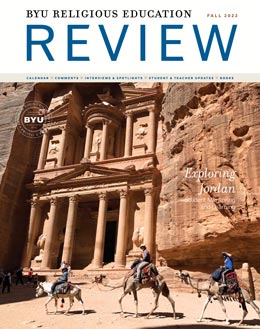The World is Our Campus
Editor's Note
Jared Ludlow, Publications Director
JARED W. LUDLOW (jared_ludlow@byu.edu) IS THE PUBLICATIONS DIRECTOR OF THE BYU RELIGIOUS STUDIES CENTER.
As I write this note at the end of the summer, it still feels too hot to be starting a new academic year. In fact, Utah set a record for the most days over 100 degrees, and it still may not be over. Despite the heat, many religion faculty and students took advantage of the summer to learn, travel, and excavate.
Religion faculty members helped in archaeological excavations in Israel at places like Huqoq, Tell es-Safi, and Tel Shimron, and in Jordan at a site highlighted in this magazine issue: Ataruz. These experiences—though hot, dirty, and labor intensive—gave students invaluable field experiences and glimpses into the ancient world.
The BYU Jerusalem Center reopened for the spring/
Church history trips for faculty and students to significant Restoration sites from New York to Nauvoo helped strengthen their testimonies of the amazing heaven-opening experiences that occurred there.
Besides sharing some of these experiences, in this issue we also discuss the significant Latter-day Saint/
Truly the world can be our campus. But even as we travel to or study about different destinations, we are reminded that this mortal life is only a small part of a grander, eternal plan. Being at religious sites help us understand a bit more about the work our Father in Heaven and Jesus Christ have done to aid us here on earth. Thus, the primary work of Religious Education—to provide spiritually strengthening and intellectually enlarging experiences—occurs in classrooms, offices, and wherever students prayerfully read their scriptures seeking answers and enlightenment. We look forward to the opportunities that this academic year will bring to provide the environment for these miracles to take place.
Jared W. Ludlow
Publications Director
BYU Religious Studies Center
